UPICares Serves Dinner at HER Shelter
By Jessica Lay
Nov. 16, 2018
Earlier this month, five members of the UPICares team served dinner to 12 women and nine children seeking refuge at the Help and Emergency Response (HER) Shelter. HER Shelter provides basic assistance and aims to promote healing and empowerment to those affected by domestic violence. The dinner was the first out of our Norfolk, Va., office and marked the beginning of 2018’s Hunger and Homelessness Awareness Week.
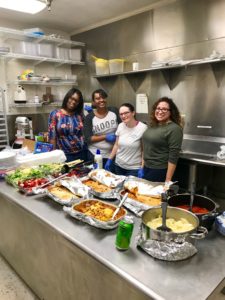
Team members Nikita, Amina, Jessica B., and Ana ready to serve dinner to shelter clients.
According to the Salvation Army, six percent of homelessness cases in the U.S. are caused by domestic violence. The National Alliance to End Homelessness reported that on a single night in January 2017, 16 percent of the overall homeless population (87,329 people) had experienced domestic violence. Survivors often need to leave home very quickly, sometimes with children or pets. This means that they must go without simple necessities like a change of clothes, food, or money.
According to the National Center on Domestic and Sexual Violence (NCDSV), the cycle of abuse starts with mounting tension, then a violent incident, and ends with a calm stage when the abuser might apologize profusely or even deny they did anything wrong at all. But not all abuse is physically violent. Abusers find many ways to control their partners.
Defining Domestic Violence
Domestic violence, also known as intimate partner violence (IPV), can manifest in several ways, such as controlling behavior, physical or sexual violence, withholding or hiding money and resources, emotional or verbal abuse, stalking, and isolation. Signs of domestic abuse can include:
- Fear of your partner or feeling threatened
- Feeling like you walk on eggshells or anxiety over potential reactions from your partner
- Feeling belittled or humiliated
- Having your possessions withheld or destroyed
- Having limited access to the phone, car, or finances
Abuse can happen to people of all ages, gender identities, and socioeconomic status. NCADV reports one in three women and one in four men have been victims of domestic violence at some point. IPV disproportionately affects those in the LGBTQ community, who might experience barriers accessing resources.
And children are often the hidden victims of domestic violence.
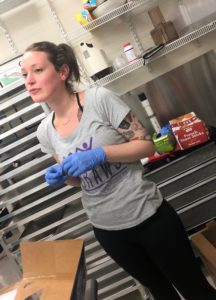
Chatting with clients in the food line.
Facts from the Childhood Domestic Violence Association(CDV):
- In the U.S., five million children witness domestic violence each year.
- Children from violent or abusive homes are much more likely to experience significant psychological problems, short and long-term.
- Those who grow up with domestic violence are six times more likely to commit suicide and 50 percent more likely to abuse drugs and alcohol.
Organizations like the HER Shelter provide warm meals, a safe place to stay, and are often the first step to survivors on their path to healing by improving economic security and overall well-being. This makes HER Shelter a perfect partner for UPIC Health, which strives to empower women every day.
“We believe we can inspire others to reach their ultimate potential, to establish a better life for themselves and their children.” -HER Shelter
UPICares volunteers arrived at the shelter with healthy food and drinks prepared ahead of time. We did not see every face while at the shelter. Some of the clients work nights and some are still healing and prefer to keep to themselves. Upon leaving the shelter, the UPICares team received many words of appreciation. One client even expressed that she wished we could cook for them every night.
The experience at the shelter inspired employees in Norfolk to launch a winter clothing drive. We hope to provide warm coats and clothing to the women, children, and teens at the shelter. If you would like to donate to HER Shelter, please contact erika@hershelter.com or call 757-485-1073.
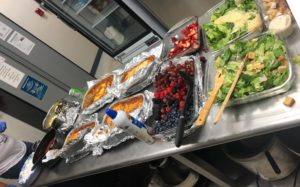
Our meal consisted of lasagna, salad, cheese ravioli and tomato sauce, and fruit with whipped cream for dessert.
No one deserves to be mistreated. If you or someone you know is experiencing intimate partner violence or domestic abuse, please contact the National Domestic Violence Hotline at 1−800−799−7233 or TTY 1−800−787−3224.
You can also visit their website at https://www.thehotline.org/
Author Jessica Lay is UPIC’s Program Lead for UPICares, the organization’s philanthropic initiative. She spends half of her time assisting patients through UPIC’s contact center and recently completed a degree in Aging Services Management. Follow us on Twitter and Instagram @UPICHealth.
Reach out for a free consultation today
Get StartedUPIC Attends N Street Night at Nationals Park
By Jessica Lay
Sept. 28, 2018
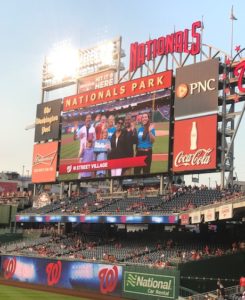
N St Village Members accepting a Spirit Award on Nats Field
UPICares volunteers had a blast at N Street Village’s Night at Nationals Park last week. Although our local team lost 2-4 against the New York Mets, the ‘friendraiser’ was a home-run for the women’s shelter that supports nearly 2,000 women a year.
UPIC employees that made in-kind donations to N St were entered into a raffle for a pair of tickets to the game. We made sure to take into consideration their most needed items at the moment: travel sized toothpaste (supplies were recently exhausted) and deodorant.

Nat fans intently watching the game.
N Street allocated great seats for the game and each ticket included a $10 concession credit and $5 donation to the Village.
To add to the excitement, the Washington Nationals honored local charities and organizations with Spirit Awards during the pre-game ceremonies. Before the first pitch, N Street employees were invited onto the ball field to accept a Spirit Award.
N Street’s mission was featured on the big screen twice, along with the logo that features a D.C. skyline.
N Street provides basic needs such as beds and warm meals for those in need. And daytime services include dental care, shelter, and wellness services, such as yoga, and much, much more. N Street’s mission is to empower homeless and low-income women in Washington D.C. to claim their highest quality of life. The Village serves about 208,000 meals and facilitates more than 5,000 showers per year.
Each woman comes to the village with her own unique set of circumstances. The Village works to meet those needs and empowers clients to overcome challenges, heal, and restore a sense of dignity and self-worth. N Street clients’ diverse challenges include:
- Disability, mental illness, addiction, 64%
- Self-reported HIV, 6%
- Lack of income, 50%
- Older population, 51% are over 50
- Discrimination, 81% percent are women of color.
“Every day at least one woman comes to N Street Village for the first time, and I know that – but for a few circumstances of fortune and timing – ‘she’ could be me.” -Schroeder Stribling, CEO of N St Village
UPICares volunteers had a blast at the game!
UPICares also is partnering with N Street in a workforce development program that clients of the Village can participate in. The program will help clients develop communications skills and prepare to get back into the workforce.
N Street is gearing up for Fall with some notable events:
- Annual Shero Walk on Saturday, Oct. 20th
- 2018 Coat Drive– N St still needs over 100 coats to reach their goal, supplies are needed by Wednesday, Oct. 24th
Author Jessica Lay is UPIC’s Program Lead for UPICares, the organization’s philanthropic initiative. She spends half of her time assisting patients through UPIC’s contact center and recently completed a degree in Aging Services Management. Follow us on Twitter and Instagram @UPICHealth.
Reach out for a free consultation today
Get StartedKennedy & Co Says Bring Your BRAWS to Our Home
FOR IMMEDIATE RELEASE
Contact: Madeline Middlebrook
Phone: (703) 772-1136
Email: mmiddlebrook@kennedynco.com
WASHINGTON, D.C. (Aug. 10, 2018) – Kennedy & Co., a woman owned and operated, boutique real estate agency based in Georgetown, D.C. is partnering with UPIC Health in a “Sip & Support” happy hour event to support a local organization that collects and distributes supplies to D.C. metro-area women in need.
The Aug. 24 event is the first non-profit night of this kind hosted by Kennedy & Co. at its 1231 Potomac St. NW location. The Sip and Support happy hour aims to collect donations in the form of cash, boxes of unopened feminine hygiene products, and new bras and underwear with tags that will be distributed by BRAWS, which “believes all women and girls should have access to tampons and pads in public restrooms, schools, shelters and jails.”
“This happy hour event is a way for our company to show support for women looking to rebuild their lives. We are so proud to be working hand-in-hand with UPIC and BRAWS, as both are as committed to serving our local community’s needs as we are,” says Kennedy & Co. Realtor Madeline Middlebrook.
Kennedy & Co and UPIC Health will provide drinks and light food, as well as information on BRAWS and continued opportunities to support women in need. Cocktail attire is advised and a method for cash donations will be provided.
Co-host, UPIC Health is 100% female owned and operated, serving the women’s reproductive health community for the last four years and partnering closely with non-profits, such as BRAWS, N Street Village in D.C. and H.E.R. Shelter in Hampton Roads, Va.
“Our organization is based on empathy and we cannot see a better way to live out that value than to support our partners,” said UPIC CEO, Mary Tucker. “We are thrilled that Kennedy & Co. has offered their space for this exciting event.”
BRAWS is a local non-profit whose mission is to bring dignity and empowerment to women and girls living in shelters by providing new personally fitted undergarments and menstrual products.
ABOUT KENNEDY & CO
Kennedy&Co is a woman-owned, luxury boutique, small business located in Georgetown, D.C. that handles residential, commercial and land transactions. If you would like more information on this event and its hosts, please call real estate sales agent Madeline Middlebrook at (703) 772-1136 or email mmiddlebrook@kenendynco.com
ABOUT UPIC HEALTH, LLC
UPIC Health is a mid-size, women-owned and operated, private organization with operations in Chantilly and Norfolk, Va. A business process outsourcer, UPIC offers patient contact center, revenue cycle management, and telebehavioral health services to clients across the country, all practicing under the value-based reimbursement concept. UPIC is a 2018 Velocity Growth Award Winner and Growth Story of the Year recipient. To learn more, visit https://www.upichealth.com or email Chief Marketing Officer, Juli Briskman at juli@upichealth.com. Follow us @UPICHealth.
Madeline Middlebrook
Real Estate Agent
Licensed in VA
703.772.1136
mmiddlebrook@kennedynco.com
kennedynco.com
Reach out for a free consultation today
Get StartedUPIC Celebrates House Bill 83 With BRAWS at Friends of Guest House
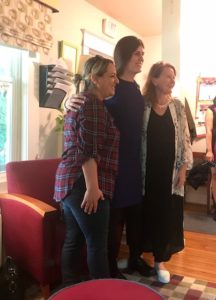
Va. Del. Dana Roem with Holly Seibold (founder of BRAWS) and Kari Galloway (executive director of FOGH)
UPICares and partner BRAWS, celebrated the passing of Virginia House Bill 83 last week, which requires the state to provide free feminine hygiene products to incarcerated women. The event honoring legislators and advocates who worked tirelessly to pass what we would call a “dignity act,” was held at Friends of Guest House in Alexandria, Va. (FOGH).
While the bill requires the state to provide the products for free in jails and prisons, the State Board of Corrections still could limit access to the products, according to a recent article on the topic. And another bill that would have eliminated the “pink taxes” on such products did not pass this session.
Shortly after a similar federal Dignity for Incarcerated Women Act was introduced by several U.S. Senators last year, the Federal Bureau of Prisons issued a memo making tampons and pads available free of charge to all incarcerated women in federal prison.
So, while the tides are turning, much more work needs to be done.
Imprisoned women’s have been instrumental in bringing the need for on-demand feminine products to the forefront of the legislative agenda. And balancing the political parties of the Virginia House in 2017 definitely helped as well. The bill was introduced by Del. Kaye Kory and supported by Northern Virginia representatives Del. Dana Roem, Del. Mark Keam, and Sen. Barbara Favola, among others.
Friends of Guest House
FOGH, which helps women transition out of prison and into society, has all sorts of real examples and data on the positive effects of treating women with dignity. The organization has helped more than 3,000 women re-enter the community since its founding in 1974.
FOGH reports that 70 percent of female offenders will re-enter the prison system if they do not have services such as those provided by the Guest House. And in fact, less than 10 percent of FOGH clients re-offend. As nearly 80 percent of the women in jail are mothers, the positive effects of FOGH services are compounded and pass through generations.
“By helping women, we have also impacted the lives of more than 4,000 children and countless families across our community,” says FOGH.
When viewing prison through the lens of reform, there should be no doubt that prisoners deserve safety, security, and basic human rights (such as pads and tampons). Providing these essentials will ensure incarcerated females can focus on what matters: healing and rehabilitation.
Thus, House Bill 83, signed by Governor Ralph Northam and effective as of July 1, is a huge step in paving the way for dignity, empathy, and healing for females in the Virginia prison system.
Author Jessica Lay is UPIC’s Program Lead for UPICares, the organization’s philanthropic initiative. She spends half of her time assisting patients through UPIC’s contact center and recently completed a degree in Aging Services Management. Follow us on Twitter @UPICHealth.
Reach out for a free consultation today
Get StartedNew BRAWS Partnership Aids Local Women Who Need It Most
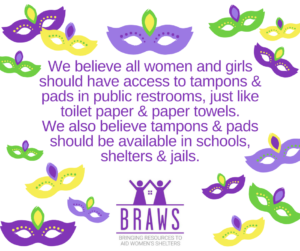 As it was Women’s Health Month, May was a great time to launch UPIC’s partnership with an organization that collects sanitary products, bras, and underwear and delivers them to women and teens in need.
As it was Women’s Health Month, May was a great time to launch UPIC’s partnership with an organization that collects sanitary products, bras, and underwear and delivers them to women and teens in need.
UPIC employees in Norfolk and Chantilly, Va. collected items for Virginia-based BRAWS (Brings Resources to Aid Women’s Shelters) and visited a local shelter to help distribute them.
When UPIC learned about BRAWS’ mission and that some women in Fairfax and Loudoun Counties were missing school, interviews, and other appointments because they did not have supplies, we knew immediately the organization aligns with our mission of Meaningful Engagement in Care and the support of women.
“Our employees were really thoughtful about the items they donated, understanding that functioning to our full potential as women requires confidence,” said Chief Marketing Officer, Juli Briskman. “It’s hard to feel confident when using products that are not comfortable or wearing undergarments that don’t fit correctly.”
Four UPIC volunteers met BRAWS organizers at the Loudoun Emergency Homeless Shelter on May 23 to find everything pre-organized into size bins. And bags had been compiled for women that had already signed up for the event and given their sizes.
Unfortunately for us, many of the women were working. But we were glad to hear they were at work and would be able to pick up their “orders” when they got back to the shelter. The women we did meet were very thankful for the items, tried some on, and left with several bags of goodies.
Many of the female residents and their families have been recently displaced by the housing crisis. And Loudoun County, which has the highest U.S. median income, has seen a surge in homelessness for singles and families, according to the Loudoun Times-Mirror.
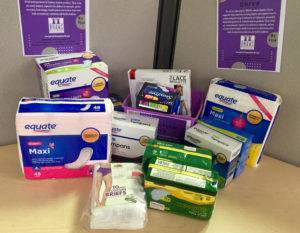
Donations collected in Chantilly, Va.
During Hard Times, Feminine Care Drops in Priority
Basic necessities such as a well-fitting bra or sanitary products are not easy to come by for much of the population. Poverty rates are higher for U.S. women than men. And over half of the 37 million Americans living in poverty, are women, according to the Center for American Progress. In combination with the prevailing wage gap and Pink Taxes, undergarments and feminine products can quickly drop to the bottom of any priority list.
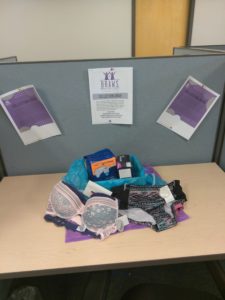
Donations collected in the Norfolk, Va. office
BRAWS has stepped in to fill this gap, working alongside shelters, such as New Hope Housing, Thrive DC, and Doorways for Women and Families (among many others). BRAWS operates several drop-off sites and has a pickup service by appointment. To learn more, visit the website.
Author Jessica Lay is UPIC’s Program Lead for UPICares, the organization’s philanthropic initiative. She spends half of her time assisting patients through UPIC’s contact center and recently completed a degree in Aging Services Management. Follow us @UPICHealth.


